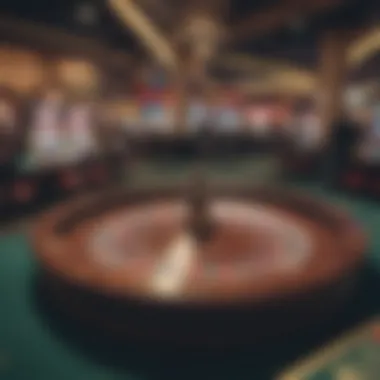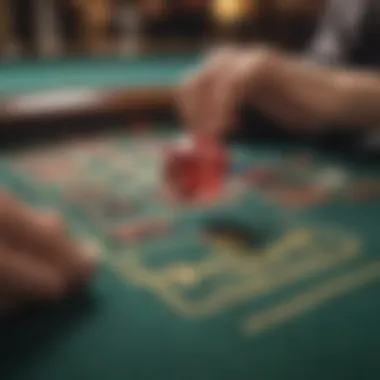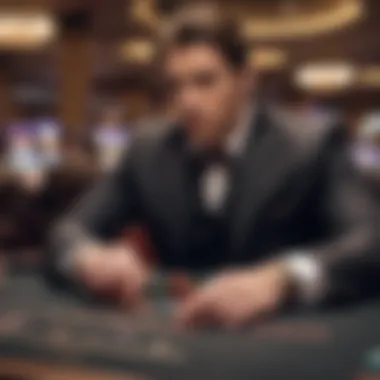Navigating the Worst Odds in Casino Games


Intro
In the world of gambling, where the thrill of winning can shift as quickly as the turn of a card, understanding the nuances of casino odds is essential. Players flock to various games, chasing fortunes that often appear just within reach. However, hidden behind the glitz and glamour lies a stark reality: not all games are created equal in terms of odds.
An exploration into the worst odds in casino games reveals more than just statistical facts; it delves into how these odds shape player behavior and strategies. With a solid grasp of house edge, probability, and the psychological aspects of gambling, players can navigate the turbulent waters of risk and reward effectively. This article will arm readers with the knowledge needed to make wiser betting choices, especially when considered more precarious games.
Let's embark on this analytical journey together, peeling back layers to uncover the implications of casino betting and explore strategies that work in light of unfavorable odds.
Prologue to Casino Odds
In the world of gambling, odds play a pivotal role in shaping the player experience and guiding decision-making processes. At the core of every game lie these odds, which dictate the likelihood of winning or losing. The crux of this article is to underscore the importance of understanding these odds, especially when venturing into games that are notorious for giving players the worst chances of success.
Defining Odds in Gambling
Odds in gambling refer to the statistical likelihood of various outcomes. They express the ratio of favorable outcomes to unfavorable ones and inform players what their chances are of winning against the house. Understanding these odds entails knowing not just the numbers but also how they function across different games. For instance, if a game has odds of 5:1, this means that for every one time the event happens, it is expected to not happen five times. This fundamental knowledge helps in making informed betting decisions, further sharpened by awareness of the house edge.
Importance of Understanding Odds
Acknowledging the importance of understanding odds extends beyond mere curiosity; it's a crucial element in responsible gambling. Here are some benefits to consider:
- Enhanced Decision-Making: Knowing the odds empowers a player to choose games that are more favorable, steering clear of those stacked against them.
- Strategic Planning: With a grasp on the odds, players can develop strategies tailored to their chosen games, maximizing potential returns while minimizing risks.
- Psychological Advantage: Awareness of the odds can help in managing expectations, potentially alleviating the emotional rollercoaster that accompanies gambling.
"A gambler who understands the odds can turn the tables, tilting the balance back towards their favor, or at least, mitigate losses."
Ultimately, this thorough understanding not only equips players with knowledge but also instills a sense of control over their gaming experiences. By recognizing and respecting the odds, players can navigate the unpredictable world of casinos with a more strategic mindset.
The Concept of House Edge
Understanding the concept of house edge is crucial for any player looking to navigate the murky waters of casino games. At its core, the house edge represents the statistical advantage that the casino holds over players. This edge can significantly affect a player's experience, chances of winning, and ultimately, their wallet.
By grasping how the house edge operates, gamblers can make more informed decisions, tailor their strategies, and potentially limit their losses. It serves as a reality check; understanding that not all games are created equal can help players not only in managing their expectations but also in refining their approach to gambling.
What is House Edge?
The house edge is essentially a built-in profit margin for the casino. This margin ensures that over time, the casino will always come out ahead. For example, if a particular game, say American Roulette, has a house edge of around 5.26%, it means that for every dollar wagered in the long run, the house expects to keep about 5.26 cents. Players might think they can beat the odds with sheer luck, but the statistical reality is that the house has designed its games to stay profitable.
It's worth noting that the house edge can vary dramatically between different games and even different betting options within the same game. This variance is what makes understanding the house edge essential for those looking to optimize their gambling strategies.
Calculating the House Edge
Calculating the house edge can sometimes feel like solving a puzzle, but it doesn't have to be. Here’s how one typically approaches it:
- Identify the Rules: Each game has specific rules dictating payout rates. For instance, in blackjack, the payout for a winning hand might differ based on varying playing rules.
- Determine the Probabilities: Calculate the likelihood of certain outcomes. For example, what is the chance of hitting a certain number on a slot machine?
- Calculate Expected Value: Multiply the probability of winning by the payout for that outcome to determine the expected value.
- Subtract from 100%: To find the house edge, subtract the expected value from 100%.
By understanding these steps, players can gauge their potential risks and rewards better, enhancing their overall gambling strategy.
House Edge Variations Across Games
Not all games present the same odds, and this is where the house edge truly shines in its role. Here’s a brief overview:
- Slot Machines: Generally exhibit higher house edges ranging between 5% to 15% or even more, depending on the specific machine.
- Blackjack: Has a relatively low house edge of about 0.5% when played with optimal strategy, making it a favorite among informed players.
- Baccarat: Depending on your bet, the house edge can vary. Betting on the banker has a lower house edge compared to the player.
- Craps: Offers a mixed bag, with some bets having a house edge as low as 1.4%, while others can be significantly higher.
"Understanding the variations in house edge is essential in identifying which games allow for the best odds to the player."
In summary, the house edge is pivotal in the realm of casinos. By knowing how it works and varies across games, players can enhance their gambling experience, strategize their bets wisely, and stay more in control of their money. Familiarity with the house edge empowers players to play smarter, setting themselves up for potentially better outcomes at the tables.
Games with the Worst Odds
When diving into the realm of casino games, the odds are often a gambler's compass, guiding them through a land dotted with pitfalls and treasures. Understanding which games present the worst odds is quite crucial. Not only does it shed light on the potential risks, but it also helps players refine their strategies.


The games we'll discuss below—slots, keno, Big Six wheel, and baccarat—are notorious for their unfavorable odds. Knowing these could make all the difference between a carefree night at the casino and a stressful chase after losses. Allotting attention to these games means acknowledging the likely outcomes, which in turn may shape how one approaches betting decisions.
Slot Machines
Slot machines, those bright and noisy beacons in a casino, entice players with promises of big payouts. Yet, they often carry some of the worst odds in gambling.
Random Number Generators
At the heart of every slot machine lies a component known as the Random Number Generator (RNG). This is the technology that ensures outcomes are unpredictable, like rolling dice on a moving train. One of its key characteristics is that it generates thousands of numbers each second, deciding the fate of your spins even before you hit the button.
The beauty of the RNG is that it's entirely impartial, making for a level playing field. However, to many players, this may feel like an unfriendly feature. Unlike games that depend on skill, slots are entirely luck-based; hence, there's no strategy you can apply. While RNGs allow for a fair chance at winning, the odds lean heavily in favor of the house. This makes them a risky gamble that can quickly drain a bankroll if one isn't careful.
Variance and Payouts
Another important factor to consider when looking at slot machines is the idea of variance and how it relates to payouts. Variance describes how often the machines pay out and how big those payouts might be. High-variance slots might only pay out occasionally, but when they do, it’s often a big win.
However, this approach to variance can be a double-edged sword. Players who chase those elusive jackpots may find themselves deeply immersed in a sequence of losses. On the other hand, low-variance slots might pay out small amounts more frequently, but the returns overall may not cover the bets. Therefore, understanding the variance helps players to temper their expectations and choose machines that match their risk tolerance.
Keno
Keno is frequently viewed as a lottery-style game with worse odds than many other casino games. While it engages player intuition—picking numbers similar to a bingo game—its odds are not kind. Here, the house edge can be quite steep, often ranging from 25% to 40%.
This game provides the illusion of control: you pick 1 to 20 numbers, and the more you match, the more you win. But don’t let that fool you. Unlike skill-driven games, Keno relies solely on luck. For a gambler looking for a thrilling experience, Keno might satisfy, but it rarely rewards those who expect consistent wins.
Big Six Wheel
The Big Six Wheel, also known as the money wheel or fortune wheel, presents a colorful assortment of outcomes with various payout options. This game often draws players in with its carnival-like atmosphere. However, its odds are less than favorable. The house edge can range between 11% to 24%, depending on the bets placed.
It’s hard to ignore the simple mechanic—bet on the segment, spin the wheel, and hope for the best. The simplicity attracts some, but beneath that lies a grim reality: expectations of frequent wins will likely lead to disappointment.
Baccarat
Baccarat, often regarded as a game for high rollers, can appear sophisticated, yet it also has its quirks when it comes to odds.
Betting Strategies
In baccarat, players can choose to bet on the player, banker, or tie. Each of these options comes with different odds and house edges, which makes strategizing a part of the game’s allure. The principle behind betting strategies is to maximize chances of winning, but the reality is that no strategy can completely erase the house edge, which is around 1.06% on banker bets.
This concept attracts many who enjoy the thrill of crafting strategies based on previous rounds. However, just like a broken clock, a strategy may occasionally yield success. Players must be prepared to face the house advantage and approach their betting with a level head.
Understanding Odds
Having a firm grasp of Understanding Odds in baccarat is paramount. Knowledge about the odds gives players awareness of potential outcomes. Players who understand the intricacies of the odds have a better chance of making informed betting decisions. Each bet has a unique payout structure, and understanding these odds helps mitigate frustration during losses.
Probability Theory in Casino Games
Understanding probability theory is crucial for anyone who regularly participates in casino games. It provides a framework for evaluating the odds and risks associated with various betting situations. Whether you're a seasoned gambler or a curious newcomer, grasping the principles of probability equips you to make better-informed decisions about where and how to wager your money. This section discussions core concepts of probability, clearing the air around common misunderstandings and showing how they directly affect gameplay.
Basics of Probability in Gambling
To begin, probability in gambling can be defined as the measure of the likelihood that a particular event will occur. When playing casino games, various outcomes are determined by chance. For instance, when you flip a coin, there's a 50% chance of it landing on heads and a 50% chance for tails.
Here are some foundational aspects that one should consider:
- Probabilities expressed as fractions. For example, in a game like roulette, if there are 38 total numbers on the wheel (1 to 36, 0, and 00), the probability of landing on any single number is 1 out of 38, or about 2.63%.
- Tracking outcomes. Understanding past outcomes can sometimes help you gauge the probability of future results. However, it’s essential to remember that each gamble is independent. This means each roll is like a clean slate, unaffected by the previous ones.
- Calculating risk. Knowing the odds helps to determine the level of risk you're taking. In certain games, like blackjack, applying correct strategies can significantly enhance your chances.
Misconceptions about Odds and Probability
Probabilities can be confusing, leading to several common misconceptions that new players often harbor. Dispelling these myths is vital for forming a more rational understanding of how casino games function.
Some prevalent misunderstandings include:


- The Gambler's Fallacy: Many players think that if a specific outcome has occurred recently, it’s less likely to happen again soon. For instance, after several spins of red in roulette, they may believe black is "due." In reality, previous spins don't influence future spins— each has the same probabilities.
- Misinterpreting House Edge: Some believe they can overcome the house edge through determination or superior technique. The house edge reflects a mathematical expectation based on probabilities, and it doesn’t change. No magical strategy can overturn these odds long-term.
- Thinking More Bets Equal More Wins: There's a tendency to believe that placing more bets increases the chance of winning big. In truth, betting more often generally increases the possibility of losing more quickly, given the constant house advantage.
"Understanding your odds is like having a compass in the chaotic world of casino betting; it won't guarantee a win, but it sure helps you navigate."
Grasping the distinctions between perception and reality when it comes to gambling odds allows players to place more strategic, guarded bets. It further enables them to peel back the layers on why certain games, despite offering enticing rewards, often leave players at a disadvantage.
Psychological Impact of Poor Odds
Understanding the psychological impact of poor odds is crucial in the analysis of casino games. When players engage in gambling, they're not just dealing with numbers and probabilities; they’re also facing their own thoughts, emotions, and decision-making patterns. This section delves into how the realization—or lack thereof—of poor odds can influence a player's behavior, choices, and ultimately, their overall experience in the casino.
Understanding Risk Perception
Risk perception plays a significant role in gambling. Players often have distorted views about the chances they face, leading them to make irrational decisions. When someone sits down at a Keno table, for instance, they might believe that since they've lost several rounds in a row, they are 'due' for a win. This thinking skews their perception of risk by underestimating the house edge and overestimating their likelihood of winning.
In many situations, gamblers are guided by emotion rather than rational thought. They may perceive a game with a poor house edge—like slot machines—as entertaining or exhilarating, which clouds their judgment. This emotional response can create a false sense of security, making the house's advantage seem less threatening than it truly is.
By comprehending one's own risk perception, a gambler can step back and reassess their choices. This awareness is vital; it can help a player to avoid the pitfalls of emotional decision-making in favor of a more calculated approach to betting.
The Gambler's Fallacy
The Gambler's Fallacy is a belief that past independent events affect the outcome of future events, particularly in games of chance. Many players assume that a string of bad luck implies a higher chance of winning the next bet. For example, if a roulette wheel has landed on red for five consecutive spins, some players might think black is 'due' to come up.
This belief overlooks the fundamental nature of randomness in casino games. Each spin, roll, or draw is independent, and the odds remain unchanged regardless of prior outcomes. The fallacy can lead gamblers to chase losses, expecting that their luck is set to turn in their favor. As a result, they might increase their wagers in hopes of recouping previous losses, often digging themselves deeper into a financial hole.
"The odds may stay the same, but the emotional stakes rise with every bet.”
It is essential for players to recognize the Gambler's Fallacy and understand that poor odds don't just represent mathematical components; they also play with their brains. Awareness of this cognitive bias can assist in making more rational decisions and ultimately managing losses better.
In summary, the psychological dynamics surrounding poor odds in casinos can significantly affect player behavior. By examining how risk perception operates and understanding the Gambler's Fallacy, players can cultivate a more informed and strategic approach to gambling. This knowledge empowers them to navigate the gambling landscape with greater awareness and potentially reduce the detrimental effects of poor odds on their decision-making.
Strategies to Mitigate Losses
When stepping into the enticing world of casinos, players often encounter unfortunate outcomes, especially in games with the worst odds. It’s easy to feel like the odds are stacked against you. However, having a set of strategies at your disposal can make all the difference. Effective loss mitigation can not only save you from deepening your financial woes but also enhance your gambling experience. In this section, we explore three pivotal strategies: Bankroll Management, Choosing Games Wisely, and Recognizing When to Walk Away.
Bankroll Management
At the core of successful gambling lies a well-structured bankroll management plan. This isn’t just a safety net; it's a guiding principle for anyone serious about their gambling pursuits.
- Setting a Budget - Determine how much money you’re prepared to spend before stepping into the casino. This is not only about having fun; it's about making sure you can afford the losses without feeling the pinch.
- Allocating Funds - Rather than treating your entire bankroll as one lump sum, break it down into smaller chunks for each session. You don’t want to throw caution to the wind and lose everything in one go.
- Adjusting Betting Sizes - Depending on your bankroll, it’s critical to adjust your betting sizes accordingly. Playing too aggressively can lead to rapid losses.
- Tracking Expenses - Keep track of your wins and losses. This practice provides a clear overview of your gambling habits, helping you to assess whether your strategies are effective.
Bankroll management is a safeguard that protects against impulsive decisions during moments of heightened excitement.
Choosing Games Wisely
Not every game in a casino is created equal. Some have significantly worse odds than others, and understanding these differences can aid in minimizing losses. Here’s how to approach this:
- Research Game Odds - Familiarize yourself with the odds of various games. For instance, Blackjack typically offers better odds compared to Keno or slot machines.
- Look for Favorable Variants - Seek out variations of games that might offer better betting options or increased player payouts, like European Roulette over American Roulette.
- Avoid Prohibition Games - Some games, like the Big Six Wheel, offer particularly poor odds and should be avoided if minimizing losses is your goal.
By selectively choosing games with more favorable odds, you enhance your chance of walking away with a win, or at the very least, a smaller loss.
Recognizing When to Walk Away
Indeed, this might be one of the toughest parts of gambling. Recognizing when to quit can often be more critical than any strategy employed before.
- Set Win and Loss Limits - Before you start playing, establish limits for both wins and losses. If you hit your loss limit, don’t let temptation sway you into playing just a bit more. It’s like the old adage says: ‘Quit while you’re ahead.’
- Stay Aware of Emotions - Emotions can cloud judgment. If you find yourself frustrated or excessively elated, consider stepping away. Strong emotional states can lead to poor decision-making.
- Exit when the Time’s Right - Sometimes you just know when the odds aren’t swinging in your favor. If you feel lucky but don't see the results, know when it’s time to call it quits for the day.
Recognizing these cues can be the thin line between a fun experience and a costly mistake. Knowing when to walk away ultimately protects your bankroll and leaves the door open for future play when the odds may ultimately be more favorable.
Remember, gambling should be fun. By employing these strategies to mitigate losses, you can focus on enjoyment while minimizing financial risk.


The Role of Regulations in Game Odds
In the realm of casino games, the role that regulations play in shaping the odds cannot be overstated. It acts like the fine print of a contract, ensuring that both players and operators are playing on a level field. Regulations help to define how games are structured, how odds are calculated, and most crucially, how the house edge is implemented. A strong regulatory framework benefits not only the casinos but also the players who frequent them. It ensures transparency and integrity in the gambling landscape, fostering trust among the participants in the industry.
Legal Standards for Fair Play
Legal standards for fair play are established to create an environment where players can gamble with peace of mind, knowing that their interests are protected. These legal frameworks, often dictated by gaming commissions, lay down the guidelines for various games, which include minimum payout percentages and the overall fairness of game design. For example, in many jurisdictions, slot machines are mandated to pay back at least a certain percentage of the money wagered over time, often around 85% to 95%.
The presence of independent audits also ensures these standards are adhered to. Testing agencies examine the random number generators and the payout structure, making sure they meet the established legal thresholds. Such checks not only safeguard player funds but also contribute to a healthier gambling environment.
"When players feel confident about the fairness of the game, they're more likely to return—not just for the chance to win, but for the overall experience."
On the flip side, lax regulations can lead to exploitation, where shady operators might manipulate odds in their favor or mislead players, creating a toxic environment for gambling.
Impact of Regulation on Player Experience
The impact of regulation on player experience is profound. Regulations that ensure fair gameplay can greatly enhance the enjoyment and satisfaction of the gambling process. Players who feel secure in the knowledge that the games they are participating in are regulated tend to have a more pleasant experience. A positive atmosphere can influence a gambler's behavior, leading to longer play sessions as players feel more comfortable.
Moreover, effective regulation can also lead to the implementation of responsible gambling measures, ensuring that players are aware of their limits and providing resources for those who may be struggling with gambling addiction. This balance of enjoyment and responsibility is crucial, as it creates a community that values safety above mere profit.
Poorly regulated environments, on the other hand, often lead to distrust among players. If a casino is known for unfair practices or if players feel that they are being taken for a ride, they tend to steer clear, which can harm the establishment’s reputation and bottom line.
Lessons Learned from Poor Odds
Understanding the dynamics of poor odds in casino games goes beyond merely identifying which games to avoid. It unravels a tapestry of player behavior, decision-making processes, and the psychological factors that come into play when the numbers aren't in your favor. Realizing the significance of these unfavorable odds can help gamblers refine their strategies and make more informed choices, which ultimately can lead to a more controlled and less emotionally driven gaming experience.
Case Studies of Casino Losses
One of the most compelling ways to learn from poor odds is by examining real-life scenarios where players faced substantial losses. Consider the plight of enthusiastic gamblers who often lean towards games with steep house edges, such as the Big Six Wheel or certain types of slot machines. Many of these players, fueled by the allure of big wins, may not grasp how these games skew in favor of the house.
A cautionary tale:
In one notable instance, a player spent hours spinning a brightly colored slot machine, believing that hitting a jackpot was only a spin away. The excitement in the air often blinds individuals to the fact that most slot machines have a house edge of up to 15% or more, sometimes crossing the threshold of 20%. As the hours passed, the player found their initial stake depleted, and their dreams of grandeur turned to dust. This case doesn’t just illustrate individual loss; it serves as a potent reminder of the systemic nature of casino odds that can be exploited.
Glimpses into forums like reddit.com often showcase numerous anecdotes of players who learned this lesson the hard way. These narratives echo the importance of understanding the mathematics behind these odds, as knowledge can be the thin line between gambling as a recreational activity and gambling as a perilous venture.
The Importance of Informed Gambling
Informed gambling is about empowerment. It’s not just about knowing what games possess poor odds; it’s an invitation for gamblers to transform their entire approach to gaming. By investing time into understanding the rules, odds, and psychological aspects of gambling, players arm themselves against the pervasive risk of loss.
- Awareness of House Edge: Recognizing which games carry a heavier house edge can guide players toward options that may offer them better chances, even if these options might not possess the glamour of flashing lights.
- Knowledge of Game Mechanics: Familiarity with the mechanics of games such as Keno or commonly neglected betting strategies in Baccarat allows players to make better weightier decisions.
- Utilizing Tools for Analysis: Players can benefit from taking advantage of resources available online, including en.wikipedia.org for understanding odds and probabilities in-depth.
Ultimately, being educated about casino odds and their implications is an ongoing journey. Players should regularly examine their choices and adapt their strategies in light of the ever-evolving casino landscape. It’s about drawing lessons from history—both personal and collective—so that risks can be managed, rather than recklessly pursued.
"Knowledge is power, especially in the unpredictable world of gambling."
Ending and Future Considerations
When it comes to casinos, understanding the worst odds is not just an exercise for enthusiasts or mathematicians; it's a crucial part of gambling wisdom. This segment wraps up the complex ideas we’ve explored and highlights the strategies and insights necessary for navigating the uncertain waters of casino games.
Summarizing Key Insights
In the whirlwind of casino betting, several key insights stand out:
- Understanding House Edge: The house edge represents the inherent advantage that casinos have over players. Knowing this helps gamblers to approach games with their eyes wide open, making educated choices rather than relying on luck alone.
- Games with Poor Odds: Identifying games such as slot machines, Keno, and the Big Six Wheel, where odds are stacked heavily against the player, is paramount. Players can avoid these traps by understanding how odds work in these games, rather than getting swept up in the superficial excitement.
- Psychological Dynamics: The psychological elements of gambling play a significant role. The gambler's fallacy, for example, can skew one’s perception of their chances of winning. Acknowledging these mental traps can empower players to make more rational decisions while gambling.
These takeaways emphasize the importance of informed gambling, where players can better manage risks and enjoy their time at the casino while minimizing losses.
Looking Ahead in Gaming Odds
As the landscape of gambling continuously evolves, it's essential to keep an eye on future trends in gaming odds. The following factors may shape the future of betting and odds:
- Technological Advancements: With the rise of online casinos and mobile betting, the dynamics of odds are changing. Algorithms determining payouts and odds will become more sophisticated, causing shifts in traditional notions of gambling.
- Regulatory Changes: Ongoing changes in gambling regulations, both at local and international levels, will impact how odds are presented and what protections are applied to players. Keeping up with these shifts can provide an edge.
- Social Gaming Trends: The increasing popularity of social gaming is another trend to watch. As new forms of poker and betting incorporate social elements, odds and gaming strategies might transform accordingly.
It's vital for gamblers and analysts alike to stay informed about these developments. By adapting to the evolving gaming environment, they can continue to make strategic decisions and navigate their gambling ventures wisely.
Playing at the casino is like dancing on a tightrope. Knowledge and strategy keep your balance, while ignorance can lead to a disastrous fall.



